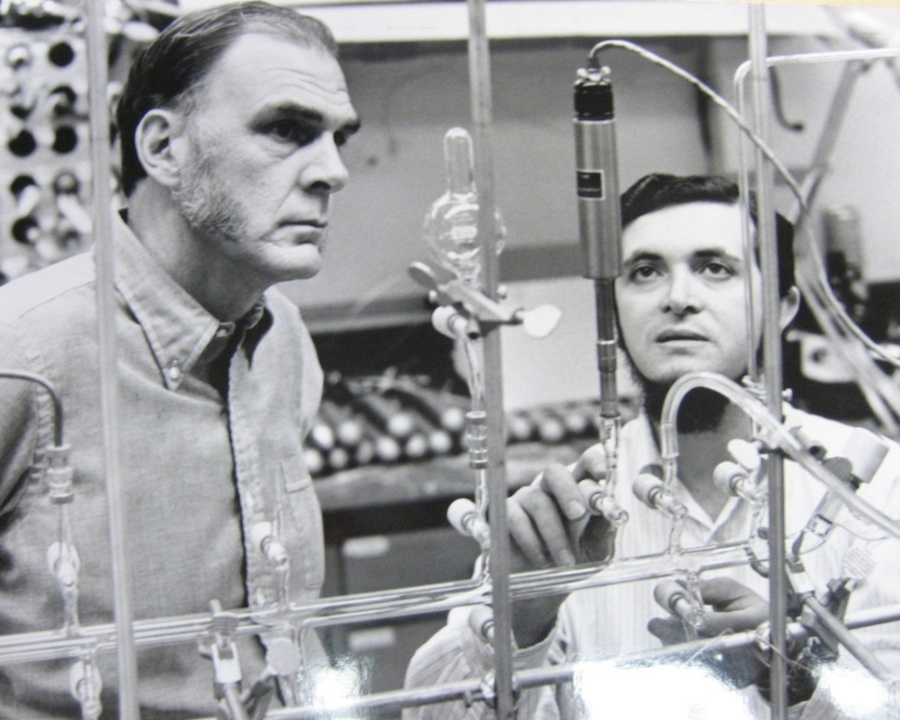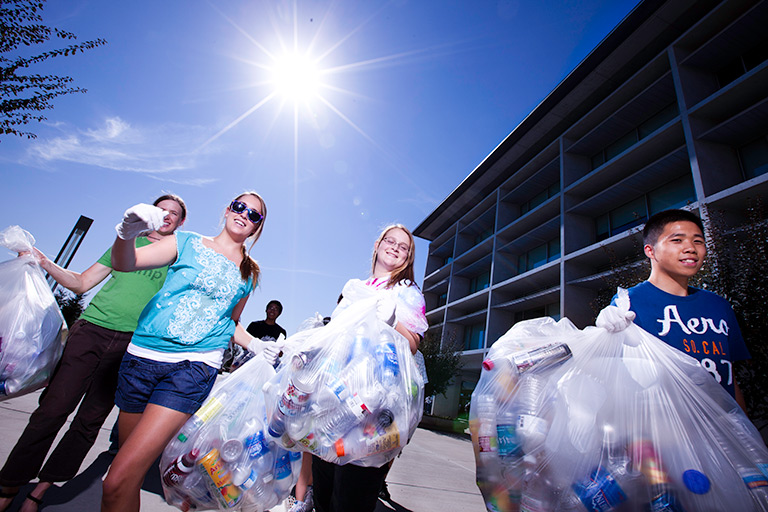Not that long ago, people around the world got together to fix a global environmental problem before it was too late.
That might sound hard to believe today, given the polarized politics on climate change, but it's true.
In 1974, two experts in atmospheric chemistry from UC Irvine, Mario Molina and F. Sherwood Rowland, made international headlines with their discovery that the widespread use of chlorofluorocarbons (CFCs) in aerosol spray cans was destroying the Earth's ozone layer, the shield that protects us from harmful ultraviolet radiation.
Their research galvanized the world into action, and today, the hole in the ozone is healing.

F. Sherwood Rowland, left, and Mario Molina, right, in the lab.
It's a story that underscores the value of basic research, and the importance of scientists making their work understood by a wider, general audience: Molina and Roland first reported their findings in the peer-reviewed journal Nature, but given the urgent implications of their discovery, decided to go public.
“The years following the publication of our paper were hectic, as we had decided to communicate the CFC-ozone issue not only to other scientists, but also to policy makers and to the news media; we realized this was the only way to insure that society would take some measures to alleviate the problem,” Molina explained.

Aerosols
Some chemical companies were skeptical and wanted more proof, but consumers were already choosing more environmentally-friendly products. In 1985, a team of British scientists ended the debate when they documented a giant hole in the ozone layer over the arctic.
Companies began to remove CFC-containing products from the market, including spray paints, industrial coolants and hair sprays. Global leaders worked together on an agreement to phase out the use of CFCs, an action that was codified with the 1987 Montreal Protocol.
Mario Molina and F. Sherwood Rowland were awarded the Nobel Prize in chemistry in 1995 for their planet-saving research. Today, the ozone hole continues to shrink, while UC's groundbreaking work on climate and sustainability takes on increased urgency.
The effect of greenhouse gases on global warming is, in my opinion, the most important environmental issue facing the world today.
Atmospheric scientist V. Ramanathan, UC San Diego
In addition to leading on climate science research, UC has also lead by example. Its sustainability and conservation efforts stem from the university's earliest days, when geology professor Joseph LeConte and famed conservationist John Muir worked together to establish the Sierra Club, with the goal of protecting and preserving the Sierra Nevada. UC alumni were also instrumental in establishing the National Park Service.
Today, the UC system is just as committed to environmental stewardship as it was then, and has made sustainable operations a priority in everything it does.
UC President Janet Napolitano in 2013 launched the Carbon Neutrality Initiative, which commits UC to emitting net zero greenhouse gases from its buildings and vehicle fleet by 2025, something no other major university system has done.
The initiative builds on UC's pioneering work in climate research, and provides a living laboratory for the UC system to enact energy-efficient measures, sustainable business practices and other strategies for cutting carbon emissions.
We are the University of California, and there is no reason that UC can't lead the world in this quest, as it has in so many others.
UC President Janet Napolitano
UC Merced, which opened in 2005 and is UC's youngest campus, is a prime example. It's the only American university to have every building on campus be environmentally certified or rated by the Leadership in Energy and Environmental Design (LEED).
All of its buildings are equipped with smart energy monitoring systems, and half of the campus' energy comes from sustainable sources, including rooftop solar panels and a one-megawatt solar panel array.

UC Merced
But Merced is not stopping there. The campus is upping the ante with its “triple zero commitment” — a pledge that by 2020, the campus will consume net zero energy, and produce zero waste and net zero greenhouse gas emissions.
As the first university to be built in this age of environmental awareness, we can truly say sustainability is infused in our DNA.
UC Merced Chancellor Dorothy Leland


